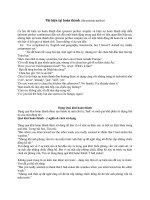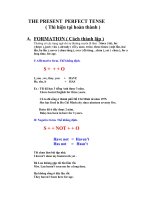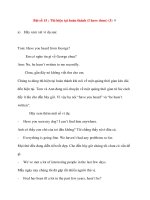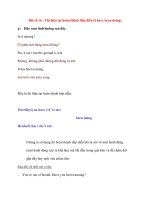Thì hiện tại hoàn thành
Bạn đang xem bản rút gọn của tài liệu. Xem và tải ngay bản đầy đủ của tài liệu tại đây (82.12 KB, 1 trang )
Present Perfect Tense
POSITIVE NEGATIVE
I
You
We
They
've (have) arrived.
I
You
We
They
haven't (have not) arrived.
He
She
It
's (has) gone.
He
She
It
hasn't (has not) gone.
QUESTION SHORT ANSWER
Have
I
you
we
they
arrived?
Yes,
No,
I
you
we
they
have.
haven't.
Has
he
she
it
gone?
Yes,
No,
he
she
it
has.
hasn't.
USE EXAMPLES
For finished situations and actions in a time
up to now
The company has grown a lot recently.
They've had some problems this month.
We haven't finished the work.
Finished experiences in your life until now He's lived in many different countries.
She's studied several languages.
We normally use the Present Perfect with ever and with time expressions like this week /
month / year, recently, in recent years, in the past few years, in the last two months, ect.
Exercise: Fill each blank with "since" or "for", then change these sentences into
negative and interogative form.
1. They have only been there for______ a few minutes.
2. I have known them ______ many years.
3. My elder sister has been a college student ______two years.
4. They have lived here ______ 2000.
5. She has been away ______ three days.
6. It hasn't rained in the region ______ several months.
7. She has been here ______ many years and she loves it.
8. My brother has worked in this motor company ______ he left university.
9. She hasn't seen her ______ closest friend ______ several years.
10.Jill has stayed in Ha Noi ______ six months.









